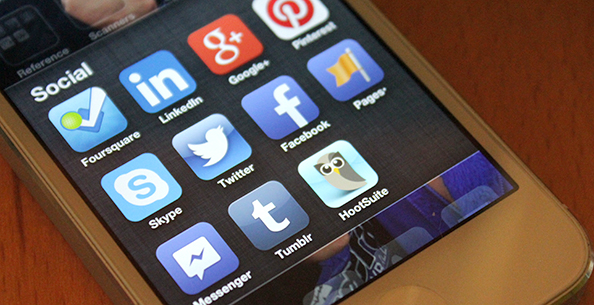Ok… now that I have your attention, let’s talk about why many business owners, CEOs, and head cheeses are not getting excited about social media, are letting marketing “play with it”, while failing to take any personal interest in social media. The numbers are quite staggering: in early August 2013, CEO.com published their second annual […] second annual Social CEO Report, in which it was clearly revealed that over two thirds (68%) of fortune 500 CEOs have no presence, whatsoever, on any of the top social networks (Facebook, twitter, LinkedIn or Google+), and only 28% of them are on LinkedIn. Even worse: only 7% of those CEOs have Facebook accounts and only 5.6% of them have a twitter account!
Is this a comfort zone issue? Are CEOs still thinking that social media is a passing fad? Are they waiting for the Facebook stock to climb back up to its initial offering price (which it just did a few weeks ago) to validate the platform? The report specifies the top reasons that one could have expected:
- No time for it
- Not comfortable with transparency
- Risky business
- Resistance to change
That last one is a killer, isn’t it? Especially coming from Fortune 500 CEOs; the leading influential executives whose decisions directly affect the world economy. Those highly paid leaders, who are selected for their audacity and drive, are resistant to change? The first invoked reason is actually even more of a problem because CEOs typically only make time for what they deem worthy of their attention. Said differently, they don’t yet see value in social media.
Sure, Warren Buffett has over half a million followers, but, so far, he has only sent out 2 tweets. Heck, Mark Zuckerberg has only trickled out 19 tweets on his twitter account to his quarter million followers (clearly, twitter is not his social network of choice: he has over 16 million followers on Facebook… go figure!).
To be fair, some CEOs do tweet out: Jack Salzwedel, who leads America Family Insurance, metered at 3,661 tweets last time I looked on August 15, 2013. Checked on that same date, even Rupert Murdoch, with his 450K+ followers had tweeted 956 messages in his account… ok he is a publisher, so I guess it’s easier for him to see the value of, well… publishing.
Enough about the fat cats; let’s talk small business. You own a small business; do YOU have an account on Facebook? If so, do you also have a company page on Facebook? What about twitter? LinkedIn? Google+? Any other social networks? As a business owner, you have no excuse to not have a profile on LinkedIn, because that is the oldest of all the leading social networks. It was started in December 2002, and it’s all about business connections. Facebook launched two years after LinkedIn, and twitter came online two years after that. Google+ is the proverbial new kid, with only two years in existence. This chronology means that if you do not exist on any of those networks, you are somewhere between 12 and 2 years behind. HOWEVER: you do know that two years is a long time in the information age. Two years ago, PCs were still the best selling computing devices out there; mobile computing meant using laptops, and a few smartphones. Two years ago, tablets were just getting started. In fact there was only one: the first generation iPad. So yes, two years is already a long time ago. Enough said?
If you are still reading this, you are probably going to ask me to explain why you, a small, medium, large or extra-large business owner, need to pay attention to social media.
As a marketing vendor, I meet business owners for a living. Some of the ones I know have a twitter account and a Facebook company page, but they usually post little or nothing (but they are not Warren Buffett). They follow no one and have not expressed any interest in learning how to leverage them, because they fail to understand the networks’ value. Let me make it easy for you and list a few interesting numbers:
- 85% of US customers research your business on the web before ever calling your business (hence the importance of website cookie-based retargeting technologies)
- Total number of facebook likes since launch: 1.3 trillion
- Daily active facebook users: 699 million, who spend an average of 20 minutes on the network
- 68% of active US internet users were on facebook at the end of 2012
- 76% of users log in at least once daily
- Top 5 brands by facebook followers:
- Coca Cola: 71,382,459
- Disney: 44,993,627
- Red Bull: 39,614,708
- Converse: 37,019,606
- Starbucks: 35,189,574
Might as well join ‘em
Do not underestimate the power of social media. Social media can still be used to virally spread a negative video with or without your participation in social media. Let’s look at that video of FedEx boxes being thrown into the back of the truck, or the one in which the FedEx box with a monitor is thrown over a fence, or the fast food restaurant employee YouTube sensation filmed licking a pile of taco shells. All of these viral videos were countered by corporate PR, using the convenient immediacy of social media (usually twitter and Facebook), to quickly reframe and counter the offensive material, and calm the public outrage, thereby minimizing damage to the brand. Did that catch your attention?
As Steve Jobs put it, “there’s one more thing”:
Your employees use social media, your kids are on social networks, most people you know who spend any time on the internet, follow at least one or two social networks, and most interact with brands. There are 1.2 billion users on Facebook, who have collectivelly “liked” 1.3 trillion times since the network was launched. Although a simple division is probably not the accurate formula for proper analysis of this fact, simple math roughly points to over 1,000 likes per user. See where I am going with this?
Social media delivers real-world market feedback better than any other marketing channels. Period.
What is the first thing you learn in sales training? Before engaging with prospects, you research them and you listen to them, if anything, so you can customize your pitches to fit their specific requirements., The more you know of the needs of your market, the better you will be able to serve it, by aligning your products to precisely correspond to real-world customer requirements and to solve their problem.
Social media provides a dynamic and instantaneous platform to:
- Provide customer support,
- Harvest products and services suggestions from your market,
- Accumulate (and publish) accolades,
- Uncover (and empower) customers who will be your champions,
- Combat negativity while protecting your brand,
- Provide an inbound marketing channel for the prospects who are willing to engage with your brand.
On August 16, 2013, a five minute outage of Google services (including YouTube and Gmail), produced a 25% drop in Internet traffic. The impact of the down time would have been even greater had the Google Edge Caches been unable to serve pre-loaded content, independently from the core Google network. The outage underscores our overall dependency on the internet in our daily lives, personal and professional. A decade ago, websites became essential to any business. In the same way, social media has become an expected communications channel to your company and brand: unless you want to miss opportunities and let your competition harvest your markets, your presence is now required to be a contender. It is worthwhile to invest your time and effort. Wade in.
In The New Rules of Marketing & PR, David Meerman Scott wrote “If you do a good job of telling your story directly, the media will find out. And then they will write about you!”, as he goes on demonstrating that public relations content is no longer pushed onto the press but rather pulled by journalists, bloggers and analysts, directly from marketing activities and any published content, including information gleaned from employees. Clear, engaging and effective writing has never been more essential for businesses, and telling your own story is now expected of any business.
Now more than ever, the CEO’s role as Chief Story Teller, whose eloquence and ability to engage are under scrutiny, requires both polish and candid humanity. A capable CEO must learn to properly navigate the nuances required to enhance and protect the brand, as well as expose the genuine qualities of character expected of any leader.




